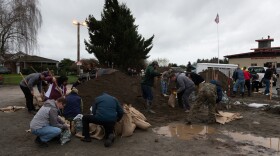Every year in late August, the tiny Makah Nation welcomes neighboring tribes and others from all over the state to celebrate its traditions and learn about its unique culture. Many of the protocols on display during Makah Days were developed over millennia in its homelands on the far northwest corner of Washington’s Olympic Peninsula.
The three-day festival includes traditional war-canoe races, bone games and dancing, salmon bakes and the crowning of tribal royalty. It also commemorates the anniversary of tribal members becoming citizens of the United States, with a big fireworks show.
And there are homecoming ceremonies for tribal members who live off the reservation. Makah Tribal Council Chairman TJ Greene says that’s a big part of the excitement for many in the tribe.
“You know, reconnect with family, reconnect with the environment out here and get recharged in their sense of values that they grew up with when they did live here,” Greene explains.
The festivities were canceled last year amid the pandemic.
This year, with most of the population vaccinated, Makah Days are resuming. But the isolated tribal nation remains closed to outsiders. And this year, Greene says the festivities will be open only to enrolled members of the tribe and people living inside the reservation boundaries.
“We still have that goal of not losing one single life to this disease, and that's, you know, that remains our top priority is our is our people's health around that,” Greene says.
The Makah Tribe was the first community in the state to shut down because of COVID-19. It closed to all outsiders to protect a population that is still rebuilding after the devastation that came with colonization. The nation has no hospital of its own and maintains fierce policies to prevent the loss of any of its members. The population is somewhere between 1,500-1,600 on the reservation, Greene says.
To date, he says the community has seen 14 cases of COVID including one elder. One person was hospitalized. All have survived.
The tribe’s current plan is to keep the reservation and Neah Bay closed until at least Oct. 1. He says protecting children who are too young to get vaccinations remains a priority.
But it’s also important to maintain the traditions that define the population.
Janine Ledford, executive director of the Makah Cultural & Research Center, welcomed back both children and adults to rehearsals of the traditional dances they will perform next month.
“It’s so nice to see the kids dancing,” she wrote in an email. “They didn’t even grumble about being required to wear masks.”
And while it’s not entirely back to business as usual, chairman Greene says there’s a special quality to the time the tribe is spending now, hunkered down together. It’s been hard to go without income from tourists.
And many tribal enterprises that depend on outside visitors have been shut down for more than a year. But he says there are also some benefits to limiting outside influences and practicing their culture for Makah Days in a manner that really connects them to each other.
“With our family members, with our other fellow community members in a way that we might not ever get to do again,” he says, adding that there has been some buzz and excitement from tribal members who look forward to having a closed event.
“That it's going to be, you know, basically all one family getting together and celebrating what we have in common. And that's our culture, our cultural values and our ceremonies and traditions that that we all love and care for.”
Greene adds that they’re blessed to able to do so in their traditional homelands – and to celebrate it in one of the most beautiful parts of the coast and of the country.
“That's something that is pretty amazing,” he says.







